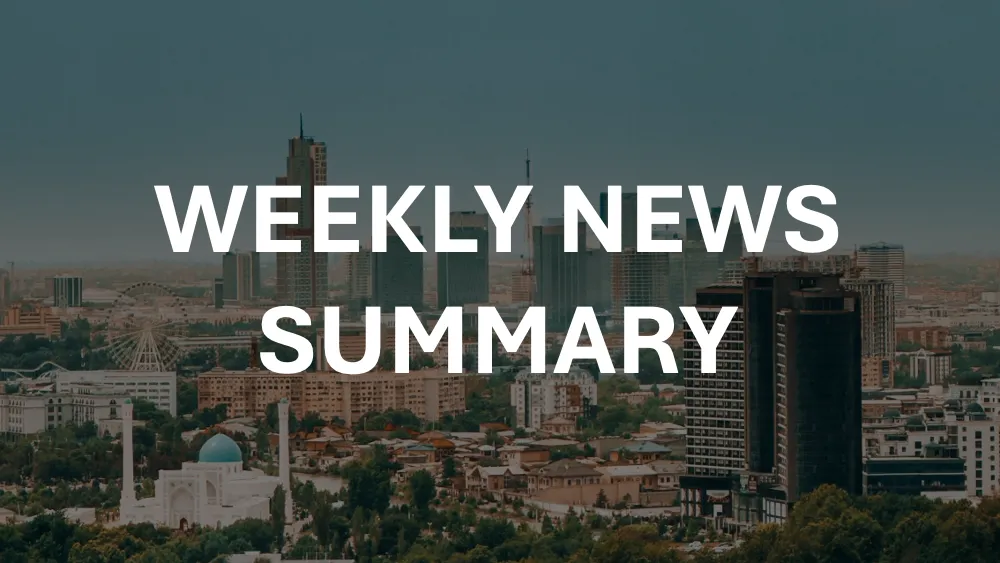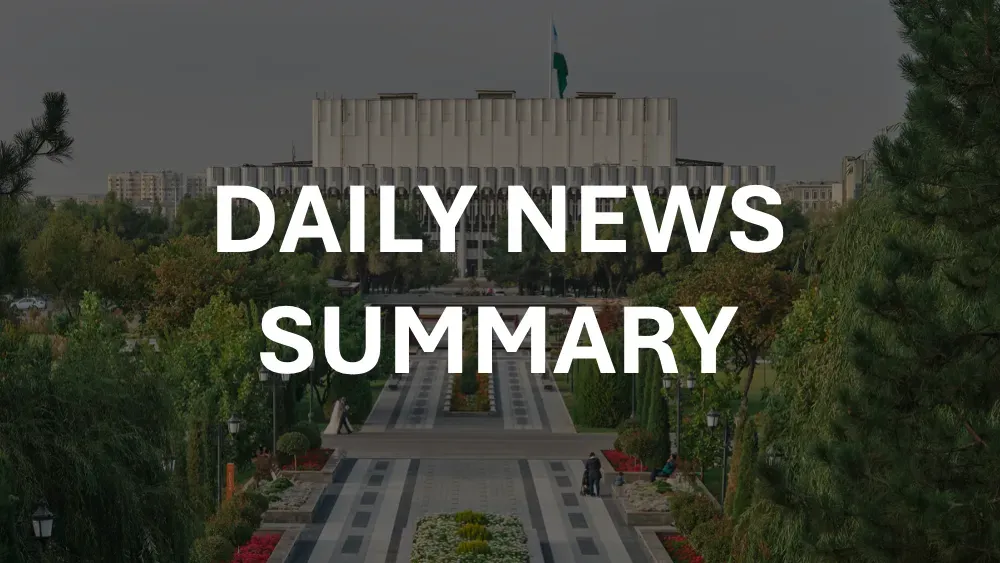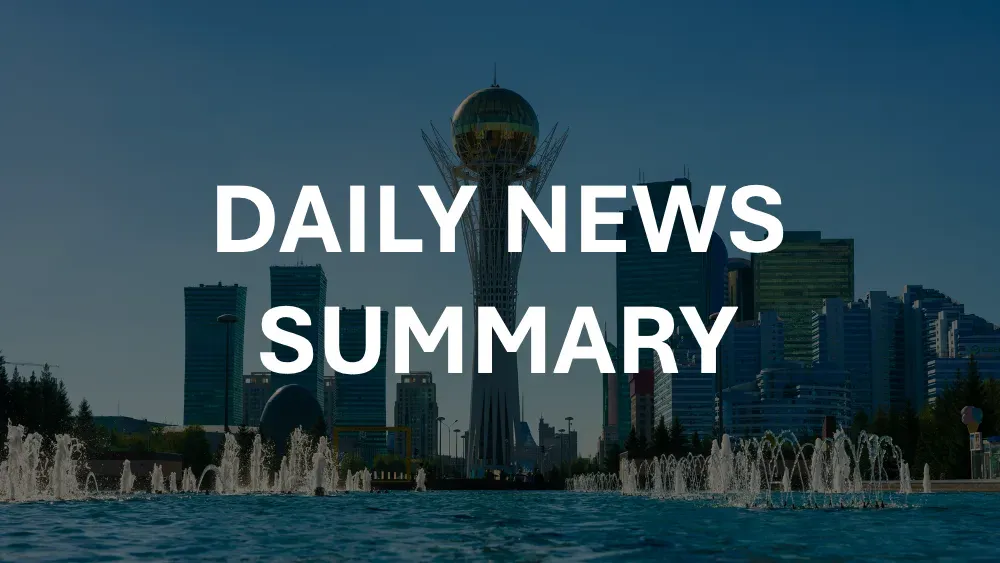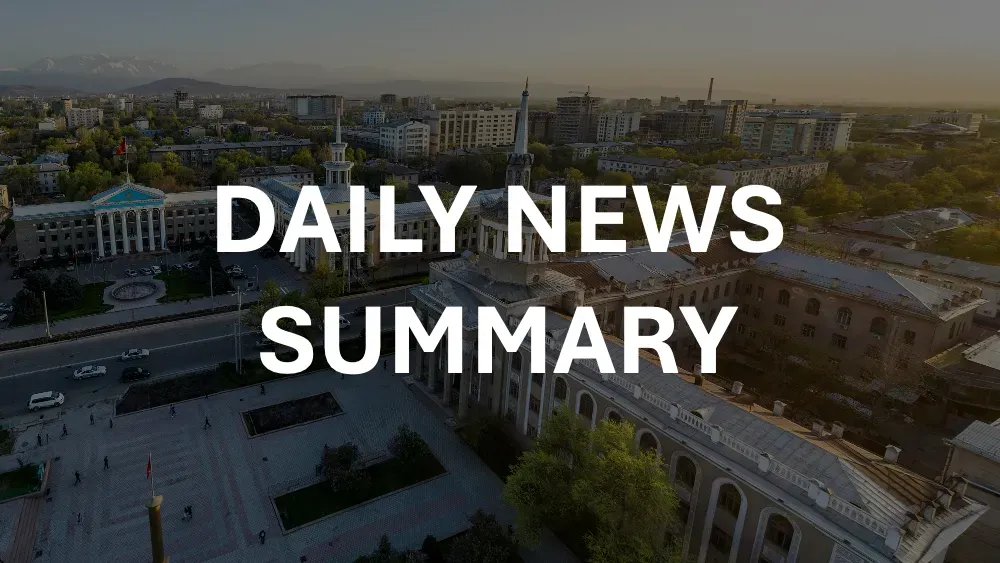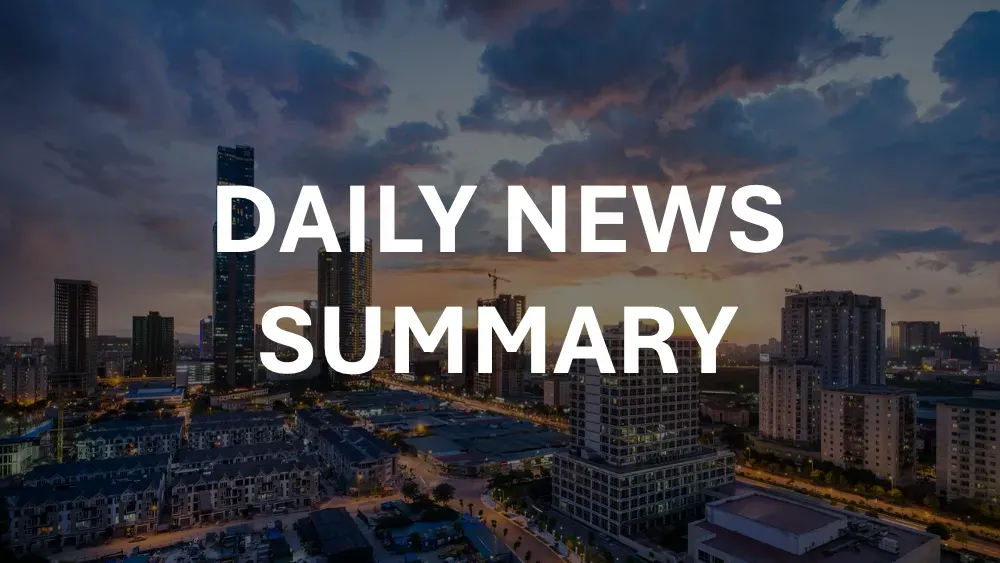This weekly digest showcases just 10 stories. Daily subscribers receive comprehensive intelligence briefs with 40 of the top stories organized by category. Don't miss the stories that matter.
Subscribe to Daily →
August 22, 2025 to August 28, 2025
This week's top 10 stories from Uzbekistan, selected from our daily intelligence briefs.
1. Tokyo and Tashkent Launch First Foreign Ministers’ Strategic Dialogue as Japan’s Top Diplomat Visits Uzbekistan
Japan’s Foreign Minister Takeshi Iwaya visited Uzbekistan on Aug. 26–27, 2025, meeting President Shavkat Mirziyoyev and co‑chairing the first Uzbekistan–Japan Strategic Dialogue at foreign‑minister level in Tashkent. The talks highlighted rising bilateral trade and major Japanese‑backed investments, and identified priority cooperation areas — chemicals, energy, IT, transport, mining and green power — with commitments to deepen political dialogue and advance concrete initiatives on trade, investment, finance‑technical assistance and cultural‑educational ties.
Both ministers signalled practical next steps: Japan pledged comprehensive support for Uzbekistan’s economic and social reforms, including infrastructure and human‑resources development, while Uzbekistan proposed expanding the Uzbekistan–Japan Center and exploring a joint university with leading Japanese institutions. The visit—timed after Uzbekistan’s National Day at Expo 2025 Osaka and ahead of the planned “Central Asia + Japan” summit—frames Tokyo as a strategic partner in Uzbekistan’s reform and diversification agenda.
From daily brief: 2025-08-28
2. Som Weakens as Central Bank Sets Higher Dollar Rate Following Recent Lows
Uzbekistan’s Central Bank raised the official USD/UZS rate to 12,354.65 on 27 August, an uptick of 48.85 so‘m from the prior day after the som had trended to its weakest level since December 2023. The adjustment closely matched market expectations of a 48–49 so‘m increase and came without official commentary, suggesting a tactical move to arrest the currency’s recent softness.
Retail market quotes at banks showed tight spreads—buy offers clustered around UZS 12,270–12,305 and sell quotes UZS 12,315–12,350—indicating modest liquidity and competitive pricing among lenders. Cross-currency moves included a euro decline to UZS 14,384.52 (down 4.65 so‘m) and a firmer Russian ruble at UZS 153.93 (up 1.37 so‘m), implying external dollar strength and regional flows may be influencing the som’s cautious stabilization.
From daily brief: 2025-08-27
3. Trade Ties Shift as Exports Top $20B with Record Gold Sales and Deeper China Share
In the first seven months of 2025 Uzbekistan’s exports topped $20 billion, driven by a record $7.7 billion in gold sales, while trade ties strengthened with the UAE, India, Afghanistan and the Netherlands and weakened with Lithuania, Turkmenistan, South Korea, the United States and Turkey. China’s share of Uzbekistan’s foreign trade rose to 18.2%, reflecting deeper integration of goods and services with the Chinese market.
The surge in bullion receipts likely cushioned external balances and underpinned headline export growth, but the growing concentration risk linked to China—coupled with asymmetric bilateral performance—signals shifting supply chains and market reorientation. For investors and traders, the twin dynamics of elevated commodity receipts and dependence on a single major partner will be central to currency pricing and near‑term trade resilience assessments.
From daily brief: 2025-08-26
4. Over 20 Heads of State to Convene in Tianjin for SCO Summit, Agenda to Refocus Cooperation and Governance
China will host the Shanghai Cooperation Organisation (SCO) summit in Tianjin on 31 August–1 September, convening leaders from more than 20 countries and representatives of over 10 international organizations, including the UN. Confirmed attendees include Presidents Vladimir Putin (Russia), Alexandr Lukashenko (Belarus), the leaders of Iran and Turkey, the Central Asian presidents of Kazakhstan, Kyrgyzstan, Tajikistan and Uzbekistan, India’s Prime Minister, and the heads of Azerbaijan and Armenia. The summit follows Belarus’s accession last year and is expected to review the SCO’s record, adopt new cooperation decisions, and set development directions.
Officials say the agenda will emphasize cohesion and institutional refinement to strengthen joint action across security, economic and connectivity initiatives. That focus suggests an effort to translate growing membership into more formal governance and programmatic outputs, with implications for regional balance, multilateral infrastructure projects and coordination on security challenges among Eurasian and Indo-Pacific actors.
From daily brief: 2025-08-23
5. AIIB Details Pipeline and Standards as Uzbekistan Becomes Top Regional Borrower
The Asian Infrastructure Investment Bank (AIIB) has become Uzbekistan’s largest regional lender, committing more than $3 billion across state‑guaranteed and private projects that prioritize green infrastructure, technology‑enabled solutions and regional connectivity. Public‑sector priorities include electrification of the Bukhara–Miskin–Urganch–Khiva rail line, climate‑resilient roads, and urban water and sanitation upgrades; on the private side AIIB financed renewables such as a 1,500 MW wind project with 300 MWh storage in Karakalpakstan. The portfolio is split roughly 56% sovereign and 44% non‑sovereign, with co‑financing from the World Bank, IFC, ADB and EBRD used to accelerate delivery and de‑risk large transactions.
AIIB applies its Environmental and Social Framework to due diligence, disclosure, grievance mechanisms and contractor compliance and will publish its first ESG annual report this year. Operational safeguards—including risk‑based monitoring, phased disbursements and cyber‑resilience requirements—are being embedded across projects, signaling a move toward stricter project selection and oversight as AIIB scales activity in Uzbekistan and the wider Central Asian region.
From daily brief: 2025-08-27
6. Avaza Summit Launches Azerbaijan–Turkmenistan–Uzbekistan Bloc on Transit, Energy, and Tariff Integration
At the Avaza summit in Turkmenistan, Presidents Ilham Aliyev (Azerbaijan), Shavkat Mirziyoyev (Uzbekistan) and Gurbanguly Berdimuhamedov (Turkmenistan) launched a formal trilateral platform to integrate transport, logistics, shipbuilding, civil aviation and a commodities exchange, signing sectoral memoranda and a pledge to coordinate tariff policy. Key measures include expansion and upgrade of the Trans‑Caspian Middle Corridor (upgrades at Turkmenbashi and Baku ports, digitalized procedures and harmonized controls), Uzbekistan’s offer of mutual tariff reductions to shorten routes to markets, and a joint roadmap plus a ministerial mechanism to oversee implementation.
Notable commercial moves: SOCAR will enter Uzbekistan’s upstream under a new agreement, with Aliyev projecting a major oil discovery there within one to two years; Tashkent proposed joint Caspian shelf exploration and unprecedented operation of Uzbek ferries across the Caspian to expand freight capacity. Leaders also flagged opportunities to tie new traffic from the China–Kyrgyzstan–Uzbekistan railway and a planned Trans‑Afghan corridor to green‑power export routes to Europe, positioning the bloc as an alternative to Russian and Iranian transit routes.
From daily brief: 2025-08-25
7. Judicial Reforms, Regional Diplomacy and Trade Data Drive Busy Policy Day
On August 22, Uzbekistan unveiled a sweeping package of justice‑sector and governance reforms aimed at strengthening rule‑of‑law and modernizing state institutions. Presidential decrees introduce lifetime appointments for judges deemed "effective" after five years, AI‑assisted case prediction, a restructured economic court system, and a plan to open 162 “Digital Court” facilities by 2030. A new Justice Academy will professionalize judicial recruitment and upskill staff; personnel moves included the appointment of a new first deputy health minister and a district governor. Complementary social measures include a voucher‑based training program for unemployed and low‑income residents.
Regionally, President Shavkat Mirziyoyev intensified diplomacy — meeting Turkmen leaders and holding trilateral talks with Azerbaijan on hydrocarbon development, electricity exports, Caspian ferry logistics and the Zangezur corridor — signaling pragmatic cooperation on energy and transport. Trade data for January–July show export‑led growth but a widening gap: total turnover reached $44.4 billion (+19.9% year‑on‑year) with a $4.2 billion deficit; gold exports jumped 80.9% to $7.7 billion (38% of total). The som has appreciated 4.2% YTD, underscoring macro stability even as reliance on gold and energy channels rises.
From daily brief: 2025-08-23
8. Presidential Dialogue Unveils Tax Cuts, Export Financing, and Tourism PPPs to Accelerate Private-Sector Growth
Uzbek President Shavkat Mirziyoyev on Aug. 21 launched a wide-ranging pro-business package at an open dialogue with entrepreneurs that aims to accelerate private‑sector growth through tax relief, financing measures and regulatory reform. Key measures include a flat 1% turnover tax for annual revenues up to UZS 1 billion effective Jan. 1, VAT transition incentives and narrower profit‑tax prepayments to free SME liquidity; a one‑year moratorium on penalties for overdue receivables and targeted export finance—$200 million for textiles pre‑export credit and $500 million in working‑capital support for other sectors; plus concessional loans and 5,000 hectares offered for tourism projects under state‑as‑shareholder PPPs.
The package also introduces an investment platform permitting revenue‑sharing capital raising, a five‑year fintech/startup strategy with open banking, and streamlined administration (a “15‑minute business” onboarding, reduced certifications) alongside a forthcoming Investment Code. For international professionals, the measures signal Uzbekistan’s push to formalize the economy, improve access to capital for exporters and SMEs, and attract project finance in tourism and infrastructure—changes that could raise formal employment and investment opportunities while increasing demand for cross‑border financing, fintech integration and public‑private partnership expertise.
From daily brief: 2025-08-22
9. China’s Shandong Huada to Invest $500 Million in Andijan Logistics Park Linking New Regional Corridors
China’s Shandong Huada Group will invest $500 million to develop rail and road logistics infrastructure in Uzbekistan’s Andijan region, the regional administration announced after talks between Governor Shuhratbek Abdurahmonov and company investors. The project targets logistics hubs in Qo‘rg‘ontepa and Xo‘jaobod districts and follows on-site inspections by officials and investors; no definitive start date was disclosed in the announcement (reported 27 Aug 2025).
Planned facilities are intended to link an emerging transregional corridor that would include a Lhasa-originating railway, the under-construction China–Kyrgyzstan–Uzbekistan line via Xinjiang, and Uzbekistan’s high-speed highway network from Andijan to Tashkent and Samarkand. If realized, the investment would strengthen Andijan’s role as a gateway for Sino–Central Asian trade, improve multimodal connectivity and could materially reduce transit times and costs for cargo moving between western China and Uzbekistan’s industrial centers.
From daily brief: 2025-08-28
10. New Telecom Regulator Established to Monitor Service Quality and Boost Competition
A new independent Telecommunications Regulation Agency was established by Presidential Decree PF-142 on 21 August 2025 (effective 23 August 2025) to strengthen oversight, monitor service quality and promote competition, while the Ministry of Digital Technologies remains the competent state authority under Articles 9 and 11 of the Law “On Telecommunications.” The agency will monitor operators’ and providers’ compliance with quality standards, report to the Cabinet of Ministers, and operate with financial and decision-making independence; initial 2025 funding comes from the Digital Technologies Development Fund, shifting to the state budget in 2026 and supplemented by 5% of state duty from telecom licensing and other lawful sources.
Implications for international stakeholders include a clearer regulatory interlocutor for market entry and compliance issues, potential changes in licensing cost allocation (via the 5% duty contribution), and a consolidation of oversight functions through staff transferred from the Ministry and the Treasury Committee. The decree’s rapid enactment signals a policy push to improve service quality and competitive dynamics in the telecom sector, which may affect incumbents’ obligations and foreign investors’ regulatory engagement in the near term.
From daily brief: 2025-08-27
These weekly highlights are a small sample of what's happening. Daily subscribers get comprehensive briefings with 40 top stories that connect the dots between events, track developing stories, and provide the context you need for informed decision-making.
Upgrade to Daily →
